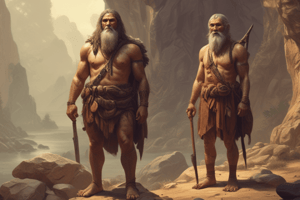Podcast
Questions and Answers
What is the primary characteristic of the Paleolithic era?
What is the primary characteristic of the Paleolithic era?
- The emergence of nation-states and the rise of monarchies
- The invention of writing and recorded history
- Nomadic hunter-gatherer societies and development of stone tools (correct)
- The development of agriculture and settled communities
Which of the following ancient civilizations is credited with the invention of writing?
Which of the following ancient civilizations is credited with the invention of writing?
- Mesopotamia (correct)
- Ancient Rome
- Ancient Egypt
- Ancient Greece
What is the primary characteristic of the Middle Ages?
What is the primary characteristic of the Middle Ages?
- The rise of colonialism and imperialism
- The system of obligation and loyalty between lords and vassals (correct)
- The emergence of nation-states and the rise of monarchies
- The development of modern democracy and human rights
Flashcards are hidden until you start studying
Study Notes
Prehistory
- Refers to the period of time before written records existed
- Dates vary, but generally considered to be from the emergence of humans to around 3000 BCE
- Divided into:
- Paleolithic (Old Stone Age): 2.5 million - 10,000 BCE
- Characterized by nomadic hunter-gatherer societies
- Development of stone tools
- Mesolithic (Middle Stone Age): 10,000 - 5,000 BCE
- Transition from nomadic to semi-sedentary lifestyles
- Development of more sophisticated tools
- Neolithic (New Stone Age): 5,000 - 2,000 BCE
- Emergence of agriculture and settled communities
- Development of more complex societies
- Paleolithic (Old Stone Age): 2.5 million - 10,000 BCE
Ancient Civilizations
- Emergence of writing and recorded history around 3000 BCE
- Notable civilizations:
- Mesopotamia (Sumeria, Babylon, Assyria): 3000 - 500 BCE
- Invented writing (cuneiform)
- Developed city-states and empires
- Ancient Egypt: 2613 - 305 BCE
- Developed hieroglyphic writing
- Built pyramids and developed a complex society
- Ancient Greece: 800 - 146 BCE
- Developed democracy and theater
- Made significant contributions to philosophy and science
- Ancient Rome: 509 - 476 CE
- Developed a republic and then an empire
- Made significant contributions to law, architecture, and governance
- Mesopotamia (Sumeria, Babylon, Assyria): 3000 - 500 BCE
Middle Ages
- Period of time from the fall of the Roman Empire to the Renaissance (500 - 1500 CE)
- Characterized by:
- Feudalism: a system of obligation and loyalty between lords and vassals
- The rise of Christianity and the Catholic Church
- The development of trade and commerce
- The emergence of nation-states
Early Modern Period
- Period of time from the Renaissance to the Enlightenment (1500 - 1800 CE)
- Characterized by:
- The Renaissance: a cultural and intellectual revival in Europe
- The emergence of nation-states and the rise of monarchies
- The development of colonialism and imperialism
- The scientific revolution and the emergence of modern science
Modern Period
- Period of time from the Enlightenment to the present (1800 CE - present)
- Characterized by:
- The Industrial Revolution: a transformation from manual labor to machine-based manufacturing
- The rise of nationalism and the emergence of new nation-states
- The development of modern democracy and human rights
- The emergence of global conflicts and international relations
Prehistory
- Human existence before written records, dates vary but generally from human emergence to around 3000 BCE
- Divided into three periods:
Paleolithic (Old Stone Age)
- 2.5 million - 10,000 BCE
- Nomadic hunter-gatherer societies
- Development of stone tools
Mesolithic (Middle Stone Age)
- 10,000 - 5,000 BCE
- Transition from nomadic to semi-sedentary lifestyles
- More sophisticated tools developed
Neolithic (New Stone Age)
- 5,000 - 2,000 BCE
- Emergence of agriculture and settled communities
- More complex societies developed
Ancient Civilizations
- Emergence of writing and recorded history around 3000 BCE
- Notable civilizations:
Mesopotamia
- 3000 - 500 BCE
- Invented writing (cuneiform)
- Developed city-states and empires
Ancient Egypt
- 2613 - 305 BCE
- Developed hieroglyphic writing
- Built pyramids and developed complex society
Ancient Greece
- 800 - 146 BCE
- Developed democracy and theater
- Significant contributions to philosophy and science
Ancient Rome
- 509 - 476 CE
- Developed republic and then empire
- Contributions to law, architecture, and governance
Middle Ages
- 500 - 1500 CE
- Characterized by:
- Feudalism: system of obligation and loyalty between lords and vassals
- Rise of Christianity and the Catholic Church
- Development of trade and commerce
- Emergence of nation-states
Early Modern Period
- 1500 - 1800 CE
- Characterized by:
- The Renaissance: cultural and intellectual revival in Europe
- Emergence of nation-states and rise of monarchies
- Development of colonialism and imperialism
- Scientific revolution and emergence of modern science
Modern Period
- 1800 CE - present
- Characterized by:
- Industrial Revolution: transformation from manual labor to machine-based manufacturing
- Rise of nationalism and emergence of new nation-states
- Development of modern democracy and human rights
- Emergence of global conflicts and international relations
Studying That Suits You
Use AI to generate personalized quizzes and flashcards to suit your learning preferences.




